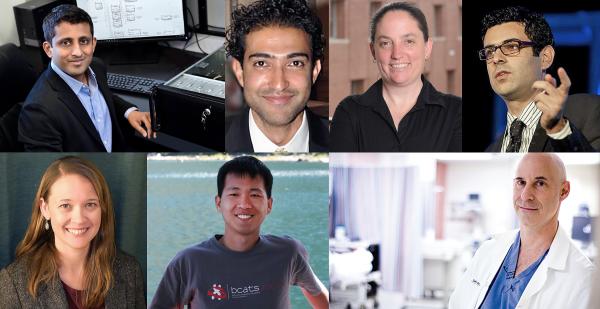The community of researchers at the Petit Institute for Bioengineering and Bioscience is closing in on 200 with the addition of seven new faculty members, including four from the Wallace H. Coulter Department of Biomedical Engineering, and several who will bolster the institute’s growing cadre of neuroengineers.
Joining the interdisciplinary research institute are Costas Arvanitis, Blair Brettman, Robert Gross, Bilal Haider, Chethan Pandarinath, Anne Pollock, and Peng Qiu.
Arvanitis, a joint assistant professor in the Coulter Department and the George W. Woodruff School of Mechanical Engineering, arrived at the Georgia Institute Technology in August 2016. As a researcher, he’s trying to understand the biological effects of ultrasound and of acoustically induced microbubble oscillations (acoustic cavitation), with the ultimate goal of developing novel therapies for the treatment of cancer and central nervous system diseases and disorders.
Brettman, assistant professor in the School of Materials Science and Engineering, comes to Georgia Tech from the University of Chicago, where she was a postdoctoral researcher in the Institute for Molecular Engineering. Her research interests at the Petit Institute will focus on developing technologies that enable multicomponent, rapidly customizable product design, with a specific focus on polymer systems.
Gross is an M.D. and a professor in the Coulter Department, based at Emory University, where he is director of the Translational Neuro-Engineering Lab. The mission there is to generate and use new technologies to improve the treatment of neurological and psychiatric disorders. The lab is interested in neuromodulation, using multi-electrode arrays, closed loop control theory, and optogenetics to address epilepsy and movement disorders.
Haider, who served a postdoctoral fellowship at University College London and earned his Ph.D. at Yale University, is an assistant professor in the Coulter Department, where he is endeavoring to link two research themes: modulation of neural networks by behavior, and network modulation of single-neuron synaptic activity. His work has showed, for the first time, that synaptic inhibition powerfully controls the spatial and temporal properties of visual processing in the awake cortex.
Pandarinath is an assistant professor in the Coulter Department, where he’s studying how the brain represents information and intention, using this knowledge to develop high-performance, robust, and practical assistive devices for people with disabilities neurological disorders. His recent work includes development of a brain-to-computer interface that can enable people with paralysis to type words and messages much more effectively.
Pollock is the Petit Institute’s lone faculty member from the School of Literature, Media, and Communication, where she is an associate professor of science, technology and culture. Her research and teaching focus on biomedicine and culture, theories of race and gender, and how science and medicine are mobilized in social justice projects. She is particularly interested in the roles of medical categories and technologies in telling stories about identity and difference, especially with regard to race, gender, and citizenship.
Qiu is an assistant professor in the Coulter Department, where his main research interests are in bioinformatics and computational biology, focusing on statistical signal processing, machine learning, control systems and optimization. He came to Georgia Tech in 2013 from the University of Texas-M.D. Anderson Cancer Center, where he was assistant professor in the Department of Bioinformatics and Computational Biology.
The addition of these seven brings the number of faculty researchers to 197 at the Petit Institute, an internationally recognized hub of research on the Georgia Tech campus, bringing together engineers and scientists to solve some of the world’s complex health challenges.
CONTACT:
Jerry Grillo
Communications Officer II
Parker H. Petit Institute for
Bioengineering and Bioscience
Media Contact
Jerry Grillo
Communications Officer II
Parker H. Petit Institute for
Bioengineering and Bioscience
Keywords
Latest BME News
Jo honored for his impact on science and mentorship
The department rises to the top in biomedical engineering programs for undergraduate education.
Commercialization program in Coulter BME announces project teams who will receive support to get their research to market.
Courses in the Wallace H. Coulter Department of Biomedical Engineering are being reformatted to incorporate AI and machine learning so students are prepared for a data-driven biotech sector.
Influenced by her mother's journey in engineering, Sriya Surapaneni hopes to inspire other young women in the field.
Coulter BME Professor Earns Tenure, Eyes Future of Innovation in Health and Medicine
The grant will fund the development of cutting-edge technology that could detect colorectal cancer through a simple breath test
The surgical support device landed Coulter BME its 4th consecutive win for the College of Engineering competition.








